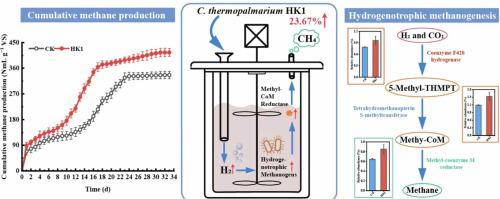当前位置:
X-MOL 学术
›
J. Environ. Chem. Eng.
›
论文详情
Our official English website, www.x-mol.net, welcomes your
feedback! (Note: you will need to create a separate account there.)
Unveiling the bioaugmentation mechanism of Clostridium thermopalmarium HK1 enhancing methane production in thermophilic anaerobic digestion of food waste
Journal of Environmental Chemical Engineering ( IF 7.4 ) Pub Date : 2024-03-26 , DOI: 10.1016/j.jece.2024.112620 Na Wang , Mengyao Xiao , Panpan Hu , Jingjing Shi , Siying Zhang , Jiping Shi , Li Liu
Journal of Environmental Chemical Engineering ( IF 7.4 ) Pub Date : 2024-03-26 , DOI: 10.1016/j.jece.2024.112620 Na Wang , Mengyao Xiao , Panpan Hu , Jingjing Shi , Siying Zhang , Jiping Shi , Li Liu

|
To enhance methane production and ensure system stability in the thermophilic anaerobic digestion (TAD) of food waste (FW), bioaugmentation is a straightforward and effective strategy. This study investigated the bioaugmentation effect of HK1 on the TAD of FW. The results showed that the cumulative methane production (CMP) and the average methane content after bioaugmentation increased by 23.67% and 22.69%, respectively. Moreover, the addition of HK1 contributed to alleviating ammonia inhibition and promoting volatile fatty acids (VFAs) conversion, thus maintaining the system stability. The dominant hydrolytic bacteria and hydrogenotrophic methanogens were enriched in the early stage after bioaugmentation. The genus was positively correlated with methane content. Metagenomic analysis further suggested that methane metabolism was strengthened, and the relative abundances of genes encoding the key functional enzymes associated with hydrogenotrophic and acetoclastic methanogenic pathways were enhanced. Therefore, bioaugmentation with HK1 had great potential for improving the efficiency of the TAD of FW.
中文翻译:

揭示热棕榈梭菌 HK1 在食物垃圾高温厌氧消化过程中提高甲烷产量的生物增强机制
为了提高食物垃圾 (FW) 高温厌氧消化 (TAD) 中的甲烷产量并确保系统稳定性,生物强化是一种简单而有效的策略。本研究调查了 HK1 对 FW TAD 的生物增强作用。结果表明,生物强化后累计甲烷产量(CMP)和平均甲烷含量分别增加了23.67%和22.69%。此外,HK1的添加有助于减轻氨抑制并促进挥发性脂肪酸(VFA)转化,从而保持系统稳定性。优势水解菌和氢营养产甲烷菌在生物强化后的早期得到富集。该属与甲烷含量呈正相关。宏基因组分析进一步表明,甲烷代谢得到加强,编码与氢营养和乙酰分解产甲烷途径相关的关键功能酶的基因的相对丰度得到增强。因此,HK1的生物强化对于提高FW的TAD效率具有巨大的潜力。
更新日期:2024-03-26
中文翻译:

揭示热棕榈梭菌 HK1 在食物垃圾高温厌氧消化过程中提高甲烷产量的生物增强机制
为了提高食物垃圾 (FW) 高温厌氧消化 (TAD) 中的甲烷产量并确保系统稳定性,生物强化是一种简单而有效的策略。本研究调查了 HK1 对 FW TAD 的生物增强作用。结果表明,生物强化后累计甲烷产量(CMP)和平均甲烷含量分别增加了23.67%和22.69%。此外,HK1的添加有助于减轻氨抑制并促进挥发性脂肪酸(VFA)转化,从而保持系统稳定性。优势水解菌和氢营养产甲烷菌在生物强化后的早期得到富集。该属与甲烷含量呈正相关。宏基因组分析进一步表明,甲烷代谢得到加强,编码与氢营养和乙酰分解产甲烷途径相关的关键功能酶的基因的相对丰度得到增强。因此,HK1的生物强化对于提高FW的TAD效率具有巨大的潜力。






























 京公网安备 11010802027423号
京公网安备 11010802027423号